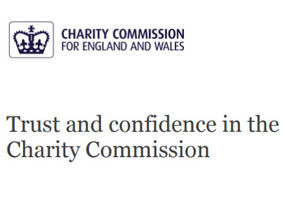The Charity Commission’s chair and chief executive have both said the regulator needs to explore new models of funding in the introduction to the Commission's 2016/17 annual report and accounts published today.
William Shawcross, chair, and Paula Sussex, chief executive, said: “Continuing to provide effective charity regulation within our current budget will be a significant challenge.
“As a responsible regulator, we must explore ways to ensure we have the funds that we need, now and in the future, to regulate charities in a way that means the public can have trust and confidence in them.”
They added they plan to launch a consultation later this year, but said any such consultation will be “subject to Treasury approval”.
Internal restructure
The report reveals that parts of the Commission have undergone internal restructuring and shows that the regulator has created a risk assessment unit which reports directly to the chief executive.
“The creation of our new risk assessment unit (RAU) in 2016/17 reflects the corporate approach to charity risk that can be built into our systems and used to determine workflow priorities,” the Commission said. “This unit brought together people who had previously been split across three areas of the business.”
It also restructured its policy and communications team to “prioritise reaching trustees and influencing their behaviour, manage a clear digital content strategy and delivery plan and control digital channels of communication”.
The operations department is also in the middle of being reorganised into four new divisions.
“Our Operations Directorate is in the process of reorganising into four new divisions with the objective of future-proofing staff structures and skills to enable handling of increasing volumes and demand on services, exploiting digital technology and casework redesign,” the report said.
The Commission employs 312 staff, a figure broadly similar to last year.
No compulsory redundancies were made, however ten people left under the Civil Service Compensation Scheme at a total cost of £309,000.
Increase in number of inquiries
The report notes an increase in the total number of charities subject to statutory inquiry, from 235 in 2015/16 to 248 in 2016/17.
It says this is partly down to a class inquiry opened during the year involving 74 connected charities, an increase in those involved in the double defaulters class inquiry, and an increase in other charities being referred for inquiry in order to deal with serious regulatory concerns.
The Commission said it has “absorbed an increase in our compliance work” and that there has been a 22 per cent reduction in the number of inquiries more than one year old. It opened 1,644 (2015/16: 1,327) operational compliance cases and closed 1,499 (2015/16: 1,309).
More charities
Applications to register a charity also increased slightly, but the time it takes to register them has reduced, said the Commission.
There was a 2 per cent increase in the number of charities applying, and a 9 per cent increase in the number of charitable incorporated organisations applying.
“Fast track application timeframes were down to three days this year,” the regulator said, “whilst average low-risk registration timeframes decreased from 32 days to 23 days and the average timeframe for all registration applications (including high risk) was down to 55 days from 58 days the previous year.”
There were a total of 8,368 applications, 6,045 of which were successful.
The Commission formally rejected 131 applications to register, this is up from 90 in 2015/16. Over 2,300 applications did not result in registration after the Commission asked for more details.
Some 4,565 were removed from the register.
“We improved the speed of removing non-charities to promote trust in charities on the register and in regulatory effectiveness,” the Commission said. “One way we have done this is by identifying and making contact with charities that default on their reporting obligations.”
Related Articles












